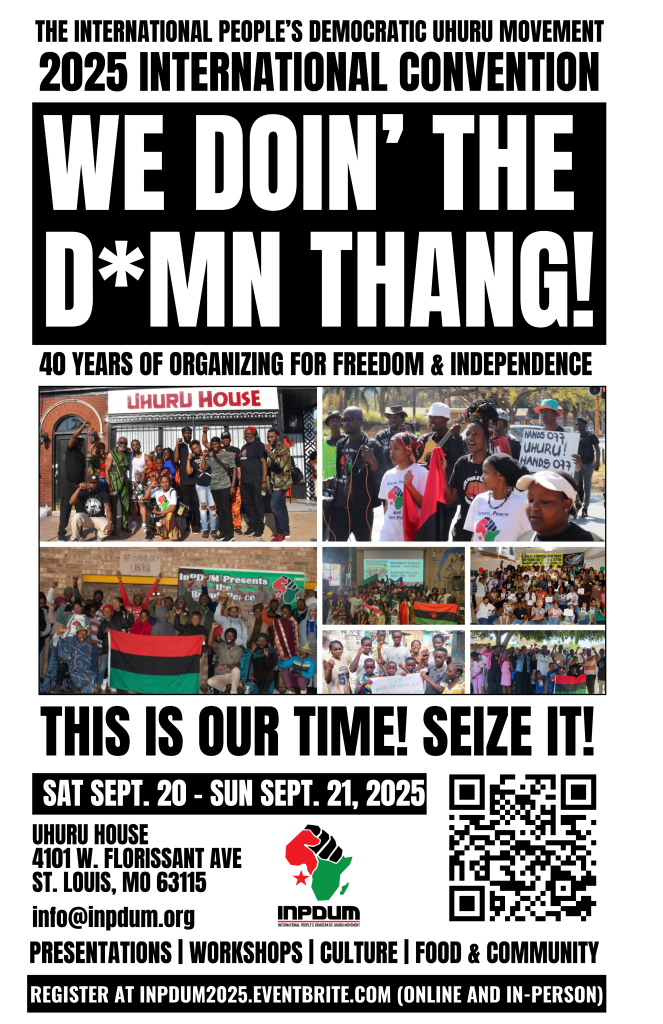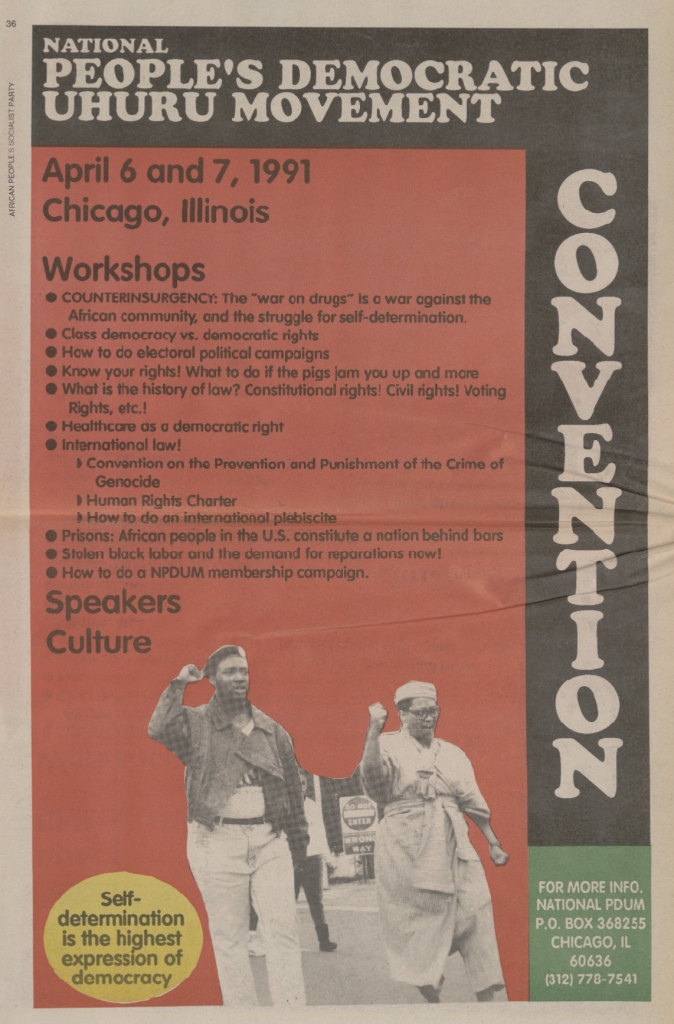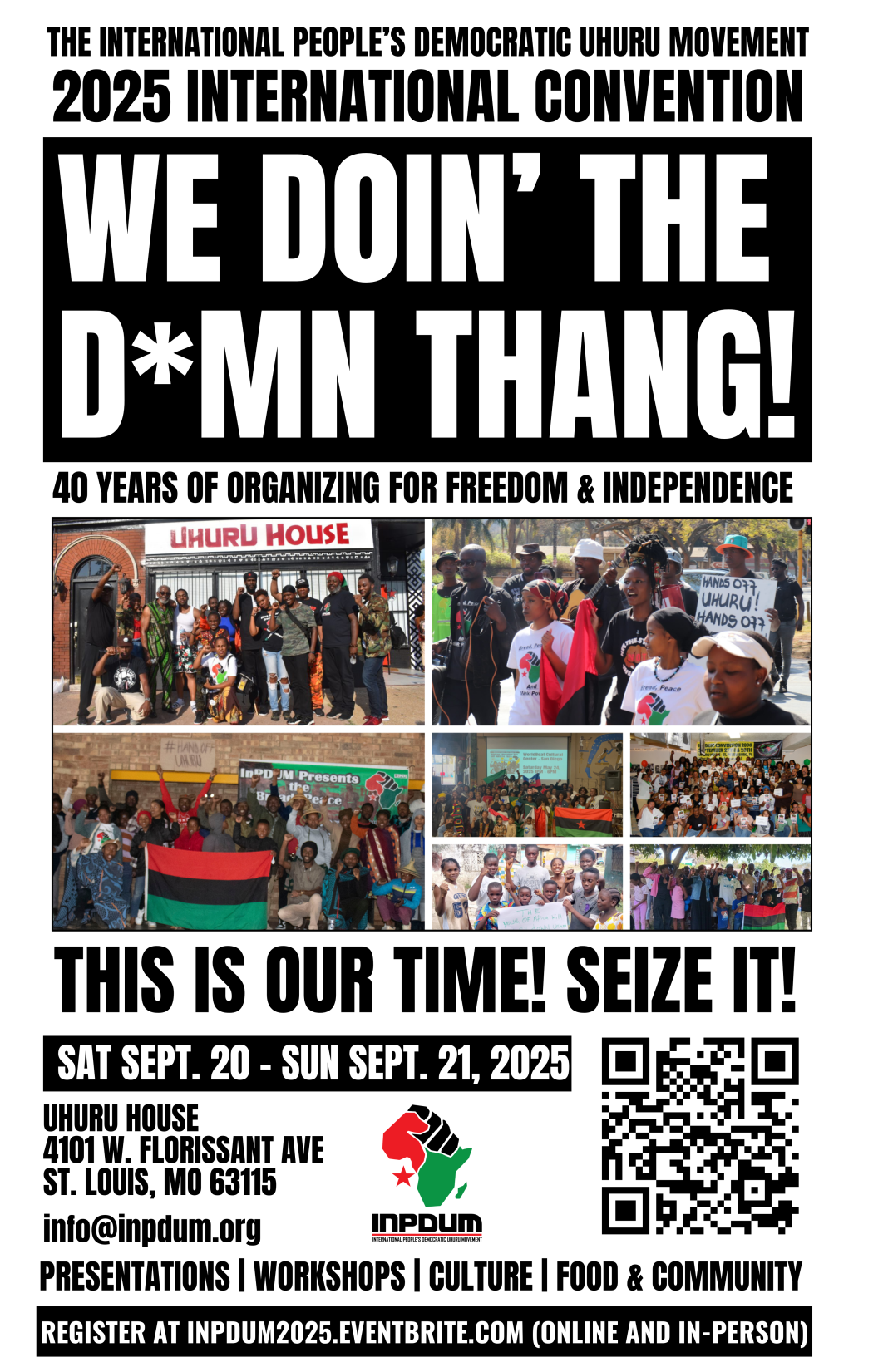InPDUM is organizing our annual international convention Saturday September 20 and Sunday September 21, 2025 in St. Louis, Missouri.
While the current global crisis rages, InPDUM and the Uhuru Movement are excited because we have been preparing for this moment for decades.
Recent victories of the Uhuru 3, the rapid growth on the African continent and the very real work we are leading towards African Independence in St. Louis, and throughout North America, prove the correctness of our strategy and trajectory.
We call on you all to come celebrate and organize with InPDUM at our historic convention.
We were made for this moment, let’s seize the time
The theme of this year’s convention is “We are Doin’ the Damn Thang! 40 Years of Organizing for Freedom and Independence! This is Our Time! Seize It!.” This theme reflects our revolutionary optimism.
InPDUM is a revolutionary mass organization under the leadership of the African People’s Socialist Party (APSP). InPDUM was formed to bring the masses of African people back into political life after the military defeat of the Black Power Movement.
Our motto is “Self-determination is the highest form of democracy.”
In 2025, InPDUM celebrates the 40th anniversary of our predecessor organization: The People’s Democratic Uhuru Movement (PDUM). PDUM was a local mass organization formed in Oakland, California in April 1985.

PDUM was consolidated as a US-wide organization in 1991 as the National People’s Democratic Uhuru Movement (NPDUM). As NPDUM established branches in Canada and Europe, and eventually Occupied Azania (South Africa), the name was officially changed to InPDUM.
In 1994, a resolution was brought to the NPDUM convention in Chicago to “Build an International People’s Democratic Uhuru Movement which will struggle for the national democratic rights of oppressed people throughout the world.” This 1994 resolution was realized with the official adoption of the name InPDUM at the 2001 convention in St. Petersburg, Florida.
Over the last four decades we have taken many forms. We are in no less than 20 states and 70 cities in the United States. We are on three continents (North America, Africa and Europe) as well as in the Caribbean. InPDUM is in ten countries, including Sierra Leone, Namibia, Zambia, Botswana, Swaziland and Occupied Azania. We also have members in Asia.
InPDUM is the leading mass organization for the struggle for democratic rights of African people around the world.
Imperialism is in a real state of crisis. The colonizers are tearing down their own institutions and waging war on colonized workers, inside the United States and around the world.
Chairman Omali Yeshitela shows us that this is all a symptom of the Uneasy Equilibrium, colonialism in crisis.
In moments of colonial crisis, it is our duty to tip the system over, not prop it up.
Africans have not taken these attacks lightly; all around the world, we are rising up.
Born out of the struggle for democratic rights, black community control
InPDUM is the result of a long history of Uhuru Movement mass organizing.
Even before the founding of PDUM, Chairman Omali Yeshitela laid down the tactics and strategies that still guide our organization in April 1977 with his historic speech and pamphlet, “The Political Aspects of Building a Mass Movement: The Tactical and Strategic Objectives for Black Liberation.”
In the late 1970s, the APSP formed its first mass organization, the African National Prison Organization (ANPO). Following that was the creation of the African National Reparations Organization (ANRO).
By the early 1980s, the dominant political trends of the parties of the colonial ruling class (the Democrats and the Republicans) reflected much of the contemporary status quo.
We know that we can lead our people to victory at this moment because we were born in a moment of struggle similar to ours today.
Chairman Omali has noted that the U.S. president Ronald Reagan rose to power with the promise to “Make America Great Again.” Reagan had made his mark with massive cutbacks and layoffs.
Following the first APSP Congress in 1981, the Party responded with the campaign for Bread, Peace and Black Power by declaring “They Say Cut Back, We Say Payback!”
This strategy opposed the liberal-left defensive posture that keeps Africans tethered to the colonial-state’s welfare programs. Following the very successful Community Control of Housing Campaign in 1984, we created the People’s Democratic Platform (PDP) in April 1985 and the PDUM.

From the People’s Democratic Platform to the Revolutionary National Democratic Program
The PDP was a five-point program (later extended to seven points) that outlined democratic demands. This included employment, black community control of the police, a pushback against the drug war waged on the African community, the rescinding of new designer drug and “tough on crime laws” that attacked the constitutional rights of the African poor and workers, and reparations.
PDUM, as well as other defense committees such as the African Community Defense Committee (ACDC), organized by the Party in the late 1980s and early 1990s, led to the consolidation of these efforts into NPDUM.
NPDUM was formed six years after PDUM in Chicago, Illinois on April 6, 1991. April 6, 1991 marked the 23rd anniversary of the assassination of Little Bobby Hutton, the youngest founding member of the Black Panther Party in Oakland, California, on April 6, 1968. Chicago was also the site of the assassinations of Fred Hampton and Mark Clark on December 4, 1969.
These murders marked the bookends of the US counterinsurgency war intended to crush the struggle for African independence. PDUM, NPDUM and InPDUM represent the resurgence of the fighting capacity of the African community to act in our own self-interest.
Join in the counteroffensive, attend the InPDUM Convention
As noted, we officially became InPDUM in 2001. In 2007, InPDUM adopted the mass program that guides our work, the 77-point program, the Revolutionary National Democratic Program (RNDP). We can see some foundational principles of the RNDP embedded in the PDP of 1985.
PDUM and NPDUM were built to defend the African community. As Chairman noted in his address to the 2008 InPDUM Convention, the RNDP places us on the offensive against colonialism.
Chairman notes that the RNDP allows us to move on the offensive against colonial-capitalism, “in a manner that requires us to do serious work among the masses of our people, thereby building the kind of united struggle that belies the claim that fighting against a popular, neo-colonialist imperialist candidate must mean isolation from the masses.”
The RNDP “is not to simply list a number of criticisms, objections and/or oppressions, but primarily to win general support for a program that unites the broadest possible group of democratic forces with the aspirations of the African working class while at the same time isolating the imperial colonial power,” Chairman states.

Whether it is Black Community Control of the Police in New York City, Project Thuthukani in South Africa, Black Community Control of Education in California, Black Community Control of Housing in London, or a host of other campaigns, InPDUM is on the counteroffensive.
It is a counteroffensive guided by 40 years of organization.
We invite you to join in the counteroffensive. At this convention, we will elect new leadership. There will be presentations from leaders of the worldwide African Revolution, including an opening keynote address by Chairman Omali Yeshitela. There will be reports from our work around the world, including Southern Africa, West Africa, Europe, the Caribbean and throughout the US.
There will be practical workshops for economic development, branch building and Black Community Control of the Police.
Register for the 2025 InPDUM Convention at: inpdum2025.eventbrite.com






